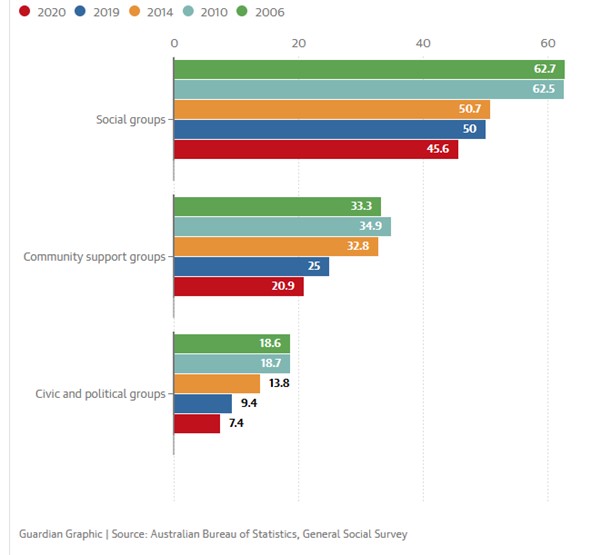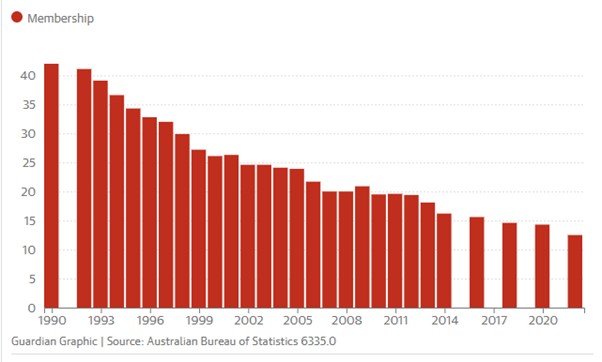Australians aren’t joining in any more – and it appears to be having big political consequences
The Guardian | November 12, 2023 | Josh Nicholas Note:To see full article click the Guardian logo
Australians, like many around the world, seem to be becoming more civically and politically detached. We don’t join or participate in local sports clubs, religious organisations or political parties at anything like the rate we used to.
And this atomisation appears to be having political consequences – final polling in the Indigenous voice to parliament referendum showed large differences in voting intention by whether people were a member of social and civic organisations.
So what does the data show about Australians and is anything replacing the connections and engagement lost from these community groups?
Prof Ariadne Vromen from the Australian National University says membership of these kinds of organisations has been declining for years. But people are also engaging in more ad hoc ways, such as through petitions or donations.

Above Chart: Showing the percentage of Australians aged 18+ that were members of social, community or civic groups in the year preceding the survey, by group type. Data from the respective General Social Surveys
Participation in social, community and civic groups fell by between eight and 10 percentage points in large surveys conducted from 2006 to 2019. It was even lower in a 2020 survey, but this was likely affected by the Covid pandemic.
Almost two-thirds of Australians were members of social groups in 2006 – including sports, religious or hobby groups – but that is now about half. Only about a quarter are members of community groups such as local service clubs and emergency services. Fewer than 10% are members of political groups, which include trade unions.
Researchers look at this kind of membership because it is a “proxy for forms of collective action and community building”, Vromen says.
“It’s the idea that if we join with others who are either like-minded or have similar lived experiences, that we can think about something bigger than ourselves, and we can work together for either, you know, the good of society, or we can lobby together for some sort of social or political change.”
The decline is particularly clear in union membership. In the 1970s, more than half of Australians were members of trade unions. This had slipped to just over 40% in the 1990s. It is now in the low teens.
Trade union membership is much higher in certain industries, among professionals and those with higher levels of education. Vromen says that, traditionally, membership in social and civic groups has tended to skew higher in those more educated.

Trade union membership has declined considerably
Showing the percentage of employees that are members of trade unions since 1990. Blank spaces show years with no data
Despite declining participation in groups, Australians are still engaging in civic activity, just in different ways, according to Vromen.
“People have moved away from traditional modes [of engagement] that are based on membership,” Vromen says. “It is membership [itself] that has diminished.”
There are a number of reasons for this, including that because of casualisation and women’s job participation, we face a much different labour market. But the internet, and especially social media and petition platforms such as Change.org, let people organise around specific issues or events.
“People [now] have ad hoc involvements based on particular issues or events or campaigns that draw them in,” Vromen says. “They might just be involved for a short period of time and then they drop out again.”
Vromen and her colleagues commissioned a survey of 5,300 people by polling firm YouGov but have not yet published the results. It found solid majorities across age groups have signed petitions or donated to social, humanitarian or charitable organisations.
By comparison, more than half of respondents in every age group said they would never attend the meeting of a political party and more than two-thirds said they would never donate to a political party.
There are also notable patterns across age groups, with more than 64% of those over 65 saying they have never and will never attend a protest or demonstration. Just 42% of those younger than 35 said the same.
“Usually the whole story is about apathetic young people,” Vromen says. “Our data doesn’t show that at all. It shows very actively engaged young people.”
